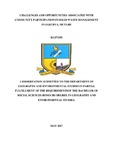Please use this identifier to cite or link to this item:
https://cris.library.msu.ac.zw//handle/11408/2657| Title: | Challenges and opportunities associated with community participation in solid waste management in Sakubva, Mutare | Authors: | Chirema, Esther Tariro | Keywords: | Community participation Solid waste management |
Issue Date: | 2017 | Publisher: | Midlands State University | Abstract: | The aim of the study was to analyse the challenges and opportunities of community participation in solid waste management in Sakubva suburb of Mutare. The research was fundamental since it envisioned unravelling more information in relation to objectives which included interrogation of the level of Sakubva community participation in solid waste management in light of the challenges and opportunities for future waste management, establishing types and amounts of waste generated, determining approaches used to manage waste, exploring the role played by the community in solid waste management, as well as analysing ways in which the public could be engaged to ensure that the communities sustainably participate in solid waste management. Snowball and purposive sampling were used in determining the sample size which comprised of a target population of 1 600 residents. Ten percent was used as a benchmark to obtain the actual sample size of 160 respondents. A triangular technique was used in data collection which included interviews with key informants, self-administered questionnaires, photographs, field observations and secondary data from organisational records, e-journals, and reports. The findings revealed that the Sakubva community is practising solid waste management activities like waste separation, reduction, reuse and recycling. They are also engaging with other stakeholders like EMA, NGOs and pressure groups to manage waste in their suburb and these have paid off with various socio-economic prospects. However, these practices have been done ineffectively as the community is lacking full legislative support, financial resources as well as adequate awareness or education on sustainable solid waste management. Furthermore, the scale of population growth is overwhelming the capacity of the Mutare City Council to provide adequate waste collection services, hence a myriad of solid waste management challenges is being faced by the Sakubva community. In light of the above, the study therefore, recommends that the City Council of Mutare, together with other stakeholders like EMA and NGOs provide financial aid to community based organisations, formulate an integrated solid waste management plan that incorporates the community, as well as conducting more, effective trainings, educational tours and awareness campaigns that involve the community on solid waste management. Policy makers should also amend already existing policies and legislations and include community engagement and participation in environmental issues. This helps to create a sense of ownership in the community and to reduce the waste management problem in the suburb. | URI: | http://hdl.handle.net/11408/2657 |
| Appears in Collections: | Bsc Geography And Environmental Studies Honours Degree |
Files in This Item:
| File | Description | Size | Format | |
|---|---|---|---|---|
| R135725H.pdf | Full Text | 1.95 MB | Adobe PDF |  View/Open |
Page view(s)
168
checked on Feb 26, 2025
Download(s)
290
checked on Feb 26, 2025
Google ScholarTM
Check
Items in MSUIR are protected by copyright, with all rights reserved, unless otherwise indicated.


